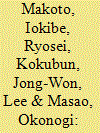| Srl | Item |
| 1 |
ID:
074809


|
|
|
|
|
| Publication |
2006.
|
| Summary/Abstract |
Because of Prime Minister Koizumi's visits to Yasukuni Shrine, Japan's friends in China and South Korea are being subjected to abuse. In Japan, meanwhile, those who voice moderate views on foreign relations find themselves attacked from both right and left. And informed observers in Europe and America are growing impatient with Japan's mishandling of relations with its neighbors.
|
|
|
|
|
|
|
|
|
|
|
|
|
|
|
|
| 2 |
ID:
074813


|
|
|
|
|
| Publication |
2006.
|
| Summary/Abstract |
In the first of a two-part article, the author recalls the events of the decade following World War II, when he was a young boy. Defeat cast Japan into confusion and chaos, and though the economy picked up sharply as a result of the surge in demand resulting from the Korean War, the confusion continued until around 1955. It was then that Japan began to sketch out the direction it would take in the decades to come.
|
|
|
|
|
|
|
|
|
|
|
|
|
|
|
|
| 3 |
ID:
074811


|
|
|
|
|
| Publication |
2006.
|
| Summary/Abstract |
In the decades to come, the Japanese workforce can be expected to shrink substantially, causing economic growth to decelerate. On the bright side, however, Japan has been building up a large store of external assets, which are producing a growing flow of income. In fact, the surplus in the income balance topped the country's trade surplus for the first time in 2005. In order to optimize future results, Japan should seek higher yields on its overseas investments; it should also promote more foreign investment in this country, both to improve the balance of its investment structure and to stimulate Japanese management.
|
|
|
|
|
|
|
|
|
|
|
|
|
|
|
|
| 4 |
ID:
074812


|
|
|
|
|
| Publication |
2006.
|
| Summary/Abstract |
Japan's "lost decade" was actually not lost, because the country's government and industry were quite busy changing, though in distinctively Japanese ways. Japanese firms have tried to enhance flexibility without undermining their existing strengths. Instead of abandoning their stable partnerships with their workers, banks, and suppliers when times were rough, they renegotiated terms with them. This contrasts with American companies, which have been quicker to lay off workers, seek new funding sources, and switch suppliers.
|
|
|
|
|
|
|
|
|
|
|
|
|
|
|
|
| 5 |
ID:
074810


|
|
|
|
|
| Publication |
2006.
|
| Summary/Abstract |
Koizumi's "fighting" foreign policy contrasts sharply with the approach taken by Kishi Nobusuke, the late-1950s prime minister who focused on improving regional ties. Kishi visited 15 Asian and Pacific countries and expressed deep apologies for Japan's wartime deeds, thereby achieving reconciliation with former enemies and putting Japan in a stronger position to secure a revision of its security treaty with the United States on more equal terms.
|
|
|
|
|
|
|
|
|
|
|
|
|
|
|
|
| 6 |
ID:
074808


|
|
|
|
|
| Publication |
2006.
|
| Summary/Abstract |
In the decades following World War II, Japan focused primarily on its relationship with the United States, but it was also able to establish reasonably good relations with many of its Asian neighbors. Since the end of the Cold War, however, the country has faced a more complex foreign policy agenda, and it has been less successful in handling it. One problem is the lack of an organ like the US National Security Council to support the prime minister in identifying issues and making decisions.
|
|
|
|
|
|
|
|
|
|
|
|
|
|
|
|